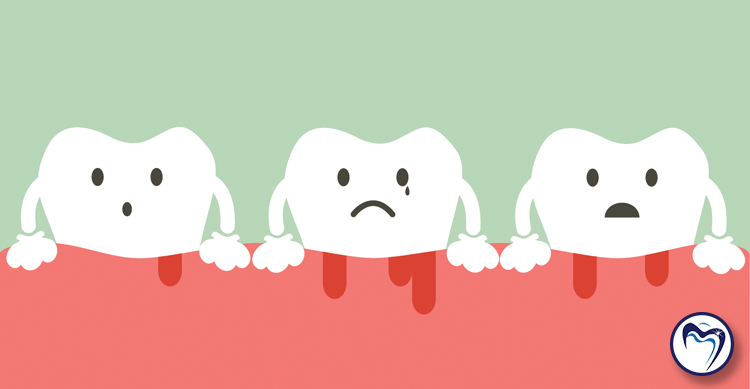
What is Periodontal Disease?
The thought of your hands bleeding when you wash them is enough to make anyone cringe. But, why then, do folks feel it is normal for their gums to bleed when they brush their teeth? Researchers at the National Institute of Health reported that over half of Americans over 30 experienced bleeding gums when they brushed. Periodontal Disease is more prevalent than you probably think. Swollen and bleeding gums are early signs that your gums are infected with bacteria. If left untreated the infection may spread and destroy structures in your jaw bone that support your teeth. In its worst cases, periodontal disease causes teeth to become so loose that they need to be removed. What is periodontal disease? How is it treated? Can it be prevented? We have the answers to these and many other questions about gum disease.
What is Periodontal Disease?
“Peri” translates to around, and “odontal” refers to teeth. Therefore, periodontal disease is an infection of the structures around the teeth. In the most extreme cases, this includes such components as the gums, cementum that covers the root, the periodontal ligament and the alveolar bone. In the earliest stages, gingivitis, meaning gum infection, may be the most common symptom. However, if you have gingivitis, it does not mean you will develop periodontal disease.
What causes Periodontal Disease?
Scientists now have substantial evidence that bacteria in dental plaque are the significant causes of periodontal disease. The research points to specific oral bacteria that infects the gum tissue that triggers a complex immune system response which leads to inflammation. This all plays a significant role in causing periodontitis. Furthermore, people with misaligned or crowded teeth, braces or bridgework could be at a higher risk because it is harder to clean the teeth properly. What’s more, researchers are finding that some individuals are more susceptible than others. Additionally, smoking increases the risk of periodontal disease. And, the risk increases the more and longer you smoke. Lastly, if you already have gum disease, smoking makes it more severe. Conditions that complicate gum disease or make people more susceptible include:
- Stress
- Medications
- Diseases such as rheumatoid arthritis and HIV infection
- Poor nutrition
Does Periodontal Disease affect overall health?
In recent years gum disease has been linked to a myriad of other health problems. Researchers are studying the following connections:
- Atherosclerosis and heart disease
- Stroke
- Premature births
- Diabetes
- Respiratory Disease
How is periodontal disease treated?
There are treatments for Periodontal Disease. The least invasive is a non-surgical treatment called scaling and root planing (SRP). Your dentist or hygenist performs this treatment by scraping and removing the plaque and tartar off of your teeth and root surfaces. It is followed by smoothing away any roughness on the roots to prevent bacteria. Other treatments include:
- Pocket Reduction Procedure
- Gum Grafts
- Regenerative Procedures
Can Periodontal Disease be prevented?
The good news is, yes. You can prevent periodontal disease, and it starts at home by practicing good oral hygiene. Use a tartar-control toothpaste and make sure to floss daily. Additionally, visit the dentist every six months for a regular dental exam, and a professional cleaning.
Contact Denise Dental today to schedule your appointment. Our qualified team will offer great tips for preventing periodontal disease. And, will treat any issues thoroughly, safely, gently, and effectively. Experience the Denise Dental difference today.

